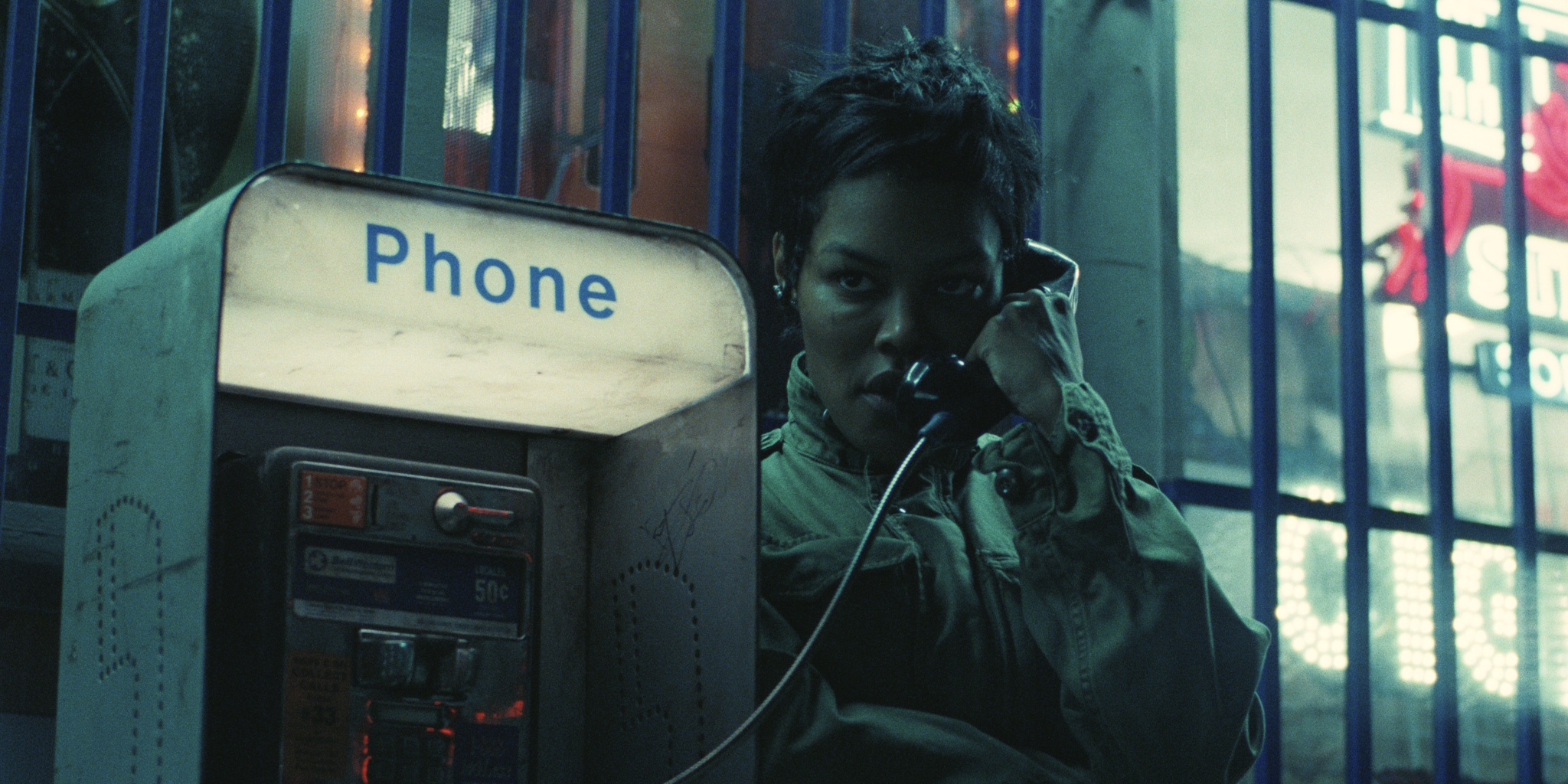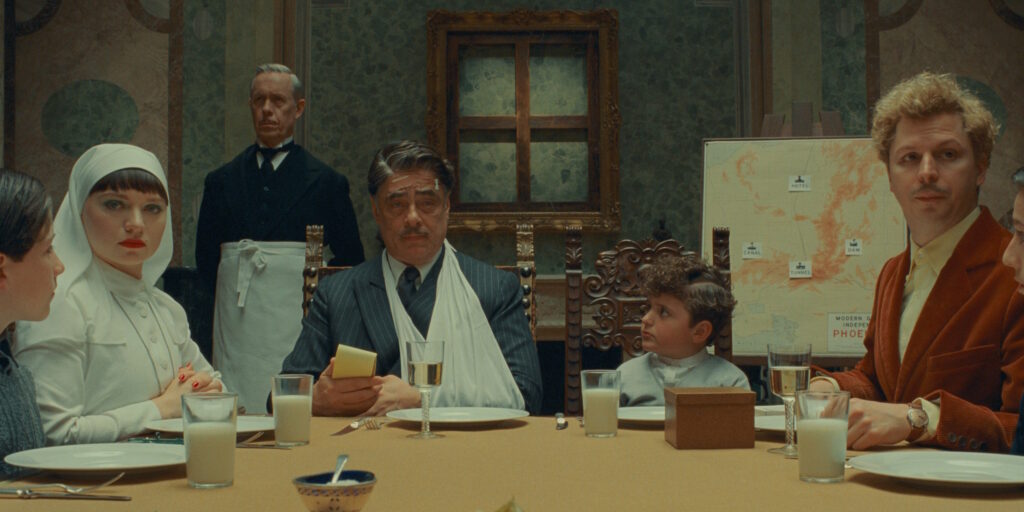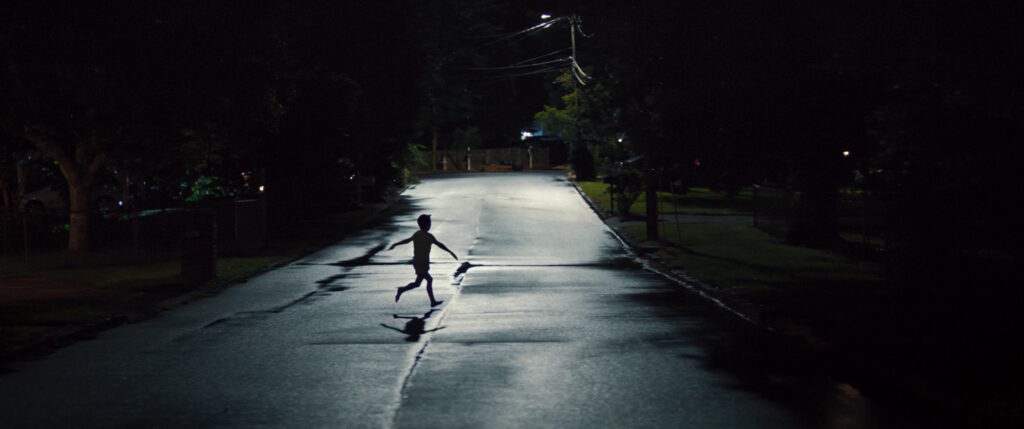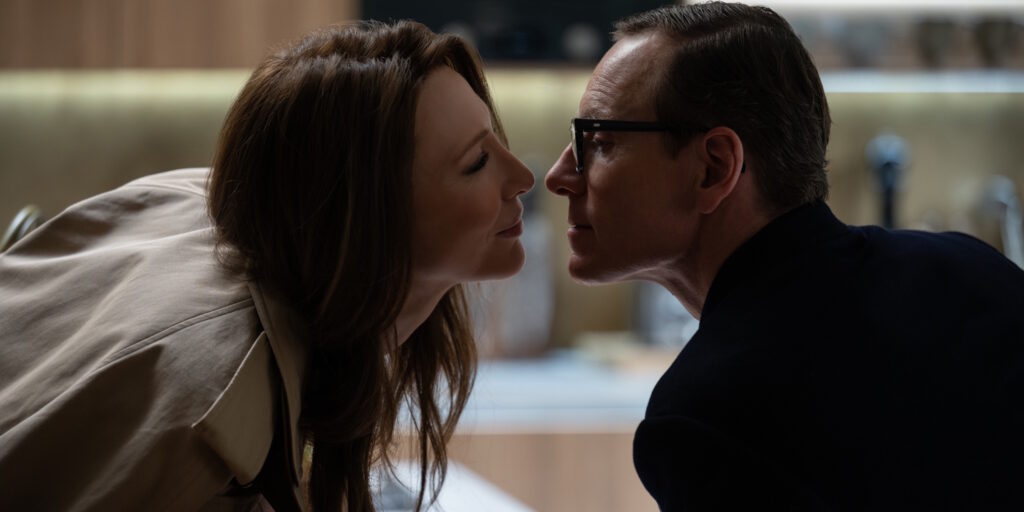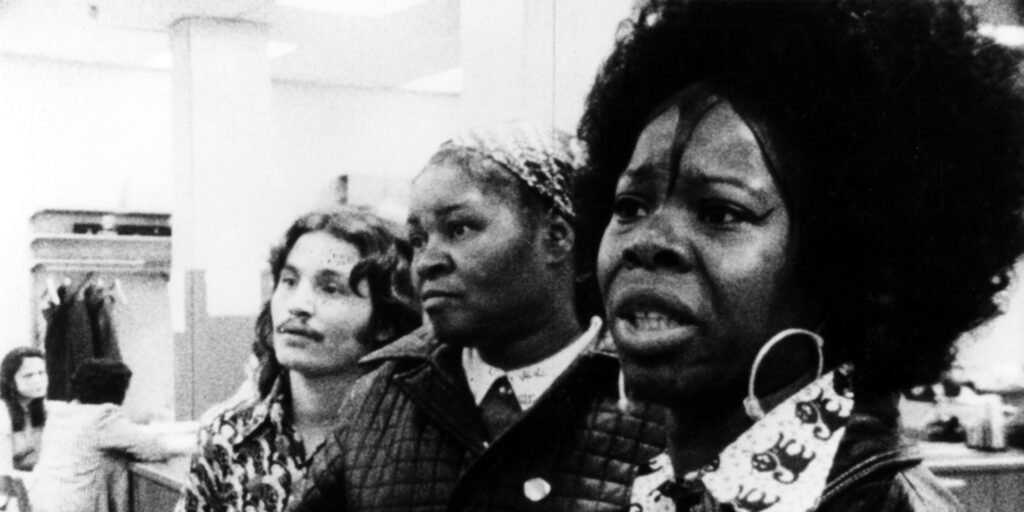[Note: This review contains spoilers for Vineland and One Battle After Another.]
At the conclusion of Thomas Pynchon’s novel Vineland, the characters are celebrating the defeat of DEA agent Brock Vond, who has seemingly died as a result of the abrupt defunding of his agency – triggered, apparently, by the government’s de facto societal victory in the war on drugs. Vond’s long-lost maybe-daughter, Prairie, returns to the site where he previously attempted to abduct her while insisting that he, not ex-hippie Zoyd Wheeler, is her true biological father. Prairie begs for Vond to return, falling asleep as she stares out into the night, whispering, “Come on, come on. I don’t care. Take me any place you want.” Vond, of course, never appears again.
This ambiguity contrasts with the conclusion created by writer-director Paul Thomas Anderson for his loose adaptation of Vineland, an ending that provides much simpler answers. In One Battle After Another, there is definitive DNA evidence that Willa (Chase Infiniti) is the child of Steven Lockjaw (Sean Penn). Instead of developing a curiosity toward this man – her other father Bob’s (Leonardo DiCaprio) lifelong adversary – Willa quickly grows to hate Lockjaw. Of course, this alteration may be attributable to generational differences. Vineland was published in 1990, which makes Prairie the Pynchon version of a young Gen X-er, but One Battle’s Willa is a stand-in for Gen Z. The latter character shows much more defiance toward the federal officer and white-supremacist wannabe who is responsible not only for the breakup of Bob’s former leftist militia, the French 75, but for also coercing her mother, Perfidia Beverly Hills (Teyanna Taylor), into sex and betrayal. For his part, Lockjaw’s search for Willa is an attempt to “tie up loose ends” before joining the exclusive Christmas Adventurers Club, a racist organization whose members chant, “Hail, St. Nick.” The club is a film invention, but nonetheless very Pynchon.
This is an apt way to describe everything in One Battle After Another: It is very Pynchon, but also not. It has all the absurd names and phrases, allowing for moments such as one where real-life rapper/actor Shayna McHale uses her stage name “Junglepussy” as her character’s moniker, inviting not a single batted eyelash. Anderson’s film has a similar atmosphere to Vineland, sharing a depiction of a parallel America that feels detached from reality but very close to it. Where it differs is that One Battle follows a cleaner narrative, perhaps in an attempt to head off a potential box-office bomb like the director’s last Pynchon adaptation, Inherent Vice, a strategy that looks to have mostly worked.
In the two months since One Battle was released, critics have widely sung the film’s praises. And, indeed, it’s as good as everyone says. The filmmaking is fantastic, Johnny Greenwood’s score perfectly evokes stress and excitement, the acting is great (especially from newcomer Infiniti and Regina Hall), its take on how everyone needs to fight the good fight is inspiring, the humor is very funny, and the rolling hills are a cinematic treat in IMAX. At the same time, the film has been criticized for its depiction of Black women, its seeming endorsement of a leftist version of the ideas critiqued by queer theorist Lee Edelman, and the cultural hypocrisy inherent in a $200 million Warner Bros. production about standing up for the oppressed and the marginalized. (Never mind star DiCaprio’s business dealings over a hotel in Tel Aviv, or the homeless encampment that was forcibly taken down for the film’s shoot.)
To be sure, One Battle is not a morally perfect movie, despite the aspirations evident in its knowledge of works like The Battle of Algiers (1966), but that doesn’t mean there isn’t value in what it does. Notwithstanding the critiques of the film’s depiction of revolution, there is something to be said about how it presents the French 75. Showing them in action for only a half-hour of the film’s two-hour-and-40-minute runtime, One Battle portrays the militia’s celebratory nature as almost dream-like, cut into a hazy, long montage as they free people from internment camps and blow up banks, shooting their guns into the air as they make their getaway. The culmination of this imagery is Ghetto Pat (Bob’s old name) and Perfidia having sex as a bomb goes off on an electrical tower a few yards away: carefree, passionate, and violent.
The group’s collective high ends once Lockjaw gets involved, forcing Perfidia into a secret affair that results in the birth of baby Charlene. (Pat is none the wiser.) Feeling pressured by motherhood and by Lockjaw’s obsession with her, Perfidia walks out on her family to affirm her commitment to the revolution. This ultimately brings about the end of her group’s glory days when a bank robbery goes south and racks up an unexpected body count. After the members are swept up in multiple arrests, including Perfidia’s, the dismantling of the French 75 results in a new reality. Gone are the exciting adventures tying up military officers and liberating immigrants; they now have to live in hiding, where any day they might end up dead. The film, thankfully, doesn’t excoriate the French 75’s actions; it makes clear their actions are well intentioned compared to those of Lockjaw’s ruthless forces, who track down ex-members and execute them in broad daylight the moment they are alone.
This aspect is what makes the majority of One Battle After Another work. As everyone is separated, arrested, or killed, there is a cloud of apocalyptic dread looming over them as the fascistic claws of the militarized law enforcement finally close into a fist. The only hope the film allows is in its ambiguity. Perfidia flees from witness protection to Mexico, her fate unknown to the others. The French 75’s DIY-tracking devices play a melancholic tune when in proximity to one another, a potential lifeline that may or may not ever pay off.
And then 15 years later, the film enters a new era. A teenage Charlene (now named Willa), showing a revolutionary spirit much like mother, is protectively raised by a worn-out Pat-turned-Bob, now an unkempt stoner who stays in all day watching movies. (If the film were closer to the book, the visual of DiCaprio jumping through a window in a dress to obtain a mental-disability check would have been nice to see.) The French 75 are still around, underground but operational, having left behind their previous bombastic strategy. Their world is shaken up once again by the return of Lockjaw, who targets Bob and Willa’s recently uncovered hideout in the small town of Baktan Cross.
It is here that the film conveys a nightmarish quality that sadly isn’t too off from reality. Lockjaw cooks up a pretext to lay siege to Baktan Cross by portraying the town’s immigrant community as one big drug ring. He enforces school raids, incites violence in the streets, and upends private lives, all as a smokescreen for his search for Bob and Willa. The town is beset by the same apocalyptic doom that Lockjaw’s leads previously brought on their enemies. And to show Anderson’s antagonization of this abuse of power, Penn’s funny but odd Lockjaw, with his GI-Joe-action-figure physicality and unpleasant nature, isn’t even the scariest character in the film. That dubious honor goes to military interrogator Danvers (played by real-life ex-Homeland Security officer James Raterman), a man whose calm demeanor and seemingly friendly attitude contrasts with his ruthless verbal strong-arming of his captives. Whether they’re a criminal or a clueless high-schooler, he pretends to give them a choice by dangling the threat of a prison sentence to coerce a confession.
During this, the invasion also marks Willa’s first brush with the French 75’s enemies. She goes on the run with the newly resurfaced Deandra (Regina Hall) – the musical “trust devices” finally activating – while Bob is warned at his home. With his only help being his daughter’s sensei, Sergio (Benecio Del Toro), their dynamic allows the film to indulge in some comedic moments amid all the stress and chaos. Contrasting with Bob freaking out over the phone, where he berates a fellow resistance member for refusing to give up a secret rendezvous location, Sergio’s collected nature and strong leadership skills showcase a resistance-group vision that the French 75 never achieved. Secretly running an underground railroad for immigrants, Sergio’s ability to assess the situation and rally most of the townspeople to help out calmly contrasts with Bob’s anxiety, a difference between the outwardly performative actions of the 75, a group Sergio later says he was inspired by, and his own’s community’s preparedness. Even when Bob tries to apologize for bringing Lockjaw on them, Sergio reassures, “We’ve been laid siege to for hundreds of years. It’s not your fault. Don’t get selfish.”
The line essentially becomes the movie’s central idea. Despite the movie’s premise being similar to other macho patriarchal-figure-saving-a-loved-one-from-danger films like Taken, One Battle makes sure to spend time turning its hapless hero into a foolish punchline. Every moment he spends frazzled and confused, and any chance he has of saving the day he inevitably messes up. In Bob, the inherent narcissism of his archetype is upended through his cluelessness. It’s a nice subversion of the power fantasy these types of films provide, where the masculine figure is set up to be the only person capable of stopping the bad guys at the expense of everyone else, pointing to the inherent selfishness that comes from a man thinking he is his family’s savior. Instead, as the father spends his time trying to find her, the daughter comes of age in the world Bob shielded her from for far too long. Willa gets her own independent storyline, discovering the truth about her mother’s actions and, after being captured by Lockjaw, extricating herself from this deadly situation.
Still, despite the film’s attempted subversion of action tropes, it stumbles in providing narrative balance. Bob’s haphazard pursuit of Willa comprises the majority of the movie, and Anderson spends more time watching him scramble around than observing Willa as she accustoms herself with the methods of the French 75. (The screen time only tilts in Willa’s favor once she falls into serious danger.) There’s also a problem with the sketchier development of the characters surrounding Bob: The film might be making fun of its white male protagonist, but the result is that the focus favors him over a cast full of people of color.
Then there’s the epilogue, which conveys an overly sentimental note that comes off as too easy compared to the film’s complicated views of revolution. The self-satisfied reductiveness of its message – let the kids handle today’s problems, even if you still have the wherewithal to fight alongside them – rings hollow. The anxious parental themes in One Battle are obvious, from the metatextual lens of Anderson raising his own biracial kids to the movie’s iconic image of a pregnant Black woman gleefully firing an automatic rifle, creating a 1-to-1 parallel between revolution and parenthood, down to the children having to live with their parents’ mistakes. However, the film’s clean-slate epilogue leaves things a little too forgiving.
Given this crowd-pleasing finish to such a broad epic action thriller, one could be forgiven for questioning if the coda was an auteurist choice or a studio mandate. And to a larger extent, one wonders how much the rest of the film was toned down. (Anderson has said himself that he cut down scenes based on test-screening reactions). Can a $200 million studio movie ever truly capture the nuance of revolution? Is it possible for any film to proffer truly groundbreaking commentary right now? The answer seems to be no. Several films released this year have ventured observations on the current political climate, with seemingly every big director aiming to make their own big statement on the world as it is today. Yet these films have mostly parrotted talking points without bringing new insight, and the results have been mixed: from Ari Aster and Yorgos Lanthimos’ takes on conspiracy theories in Eddington and Bugonia, respectively, to social satires making fun of class or celebrity worship, as in Opus, Mickey 17, The White Lotus, Mountainhead, Him, and Death of a Unicorn. Among this year’s aspiring cinematic political and cultural statements, One Battle After Another stands tall, even with its missteps, and only because Anderson understands the emotional hook of the story: two people finding each other in a country that feels like it’s on the brink of collapse.
The moment One Battle After Another reaches the same complex heights as Vineland lies in its climax. After an intense chase through the hills, involving people pursuing each other for different reasons, not knowing who one or the other are, Bob and Willa finally reunite. However, their separate journeys have created a divide. Bob, wary of the situation due to several close calls, arrives with a rifle in hand. Willa, exhausted and traumatized after spending days on the run, escaping from a kidnapping, and now having killed someone, points her gun at a man she now knows is not her actual father. Their first sight of one other is through a scope. Not knowing whether to trust this man anymore, all she can do is scream the sacred French 75 pass phrases – the lyrics to one of the most popular protest songs of the 1970s.
Their standoff embodies a conflict that has been swirling around father and daughter for the whole film: the fight between connection and individuality. Both sides of this tension are illustrated throughout the film, from the individualistic actions of the French 75 and the collective focus of Sergio’s group, to Perfidia choosing to fight for herself at the expense of her family, to Bob dropping out while the remaining militia work to rebuild. Here at the end, the conflict crystalizes into a defining moment. Will father and daughter shoot one other? Will Bob rise up and embrace his role as a dad, providing comfort toward his clearly distressed teenager? Will Willa, having feared for her life, make the choice to kill Bob, leaving her one less person to worry about, regardless of whether he is an ally or enemy?
Thankfully, this scene doesn’t give way to tragedy. Soundtracked by the distant, now-harmonized music of the trust devices, Bob gives Willa someone to trust, reassuring her and finally remembering the next line of Gil Scott-Heron’s “The Revolution Will Not Be Televised.” He puts down his gun, and Willa responds in kind to the gesture, embracing him on the windy desert road amid a dead body and car wreckage. It gives this climatic moment more emotional weight: Even at what feels like the end of the world, where nothing makes sense and everyone is out to kill you, the best thing you can hope for is not revolution or radical change, but someone being there for you.
One Battle After Another may not be as radical as everyone wants it to be, but at least it honestly expresses just how hopeless everything feels right now, as the world slides into an unfathomable reality. And although it is admirable to fight against that ongoing, corruptive descent, what matters just as much is an effort to build and sustain a community worth fighting for.
One Battle After Another is now playing in select theaters.
